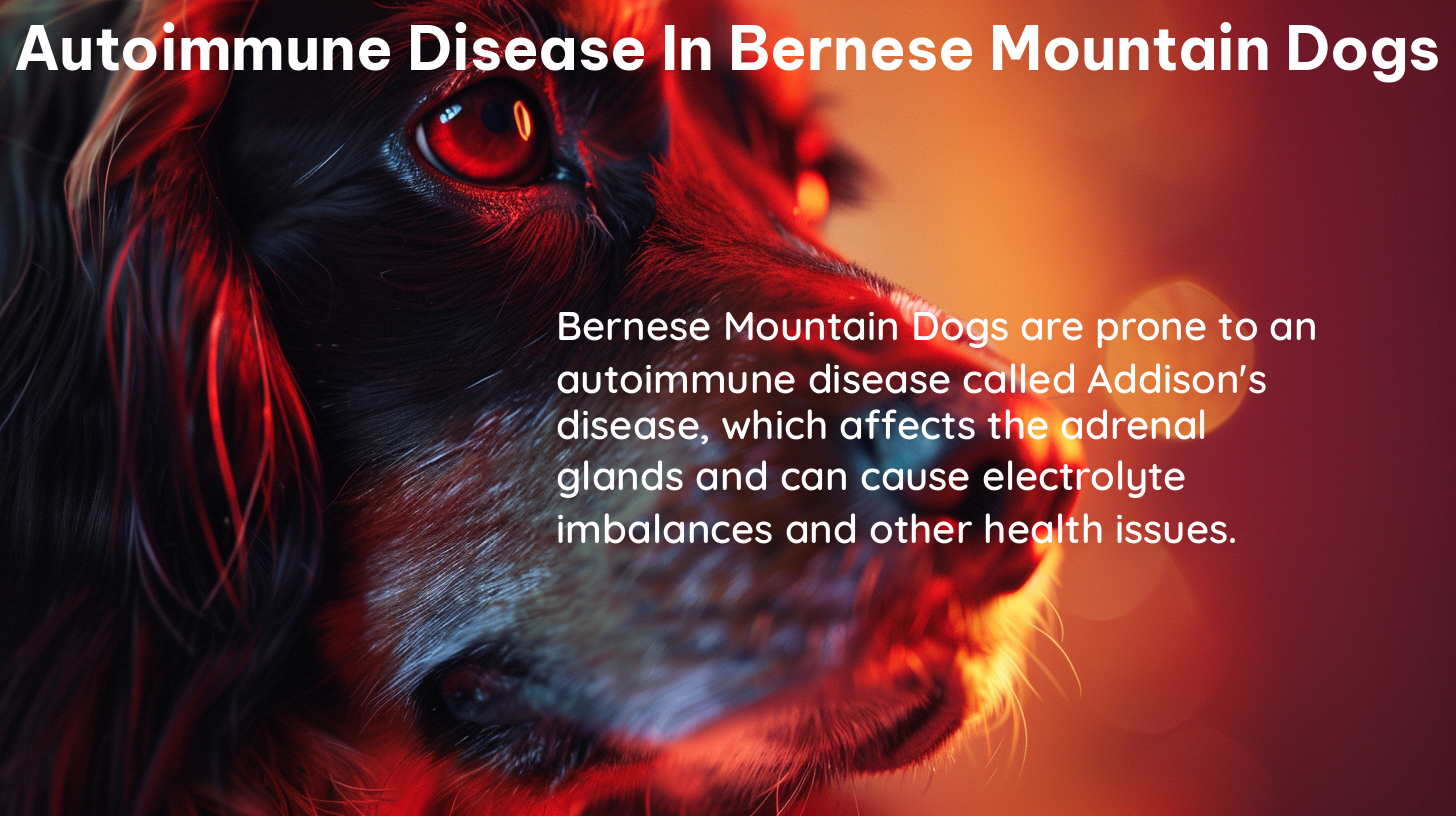Autoimmune diseases are a significant concern for Bernese Mountain Dogs, a breed known for their gentle and intelligent nature. These diseases occur when the dog’s immune system mistakenly attacks its own cells and tissues, leading to various health issues. In this blog post, we will explore the common autoimmune disorders affecting Bernese Mountain Dogs, and discuss how breeders and owners can manage these conditions.
Common Autoimmune Disorders in Bernese Mountain Dogs

Aseptic Meningitis
Aseptic meningitis is a potentially life-threatening condition that can be difficult to diagnose. It typically affects dogs between 3 and 12 months old, with no sex predilection. Symptoms may include fever, lethargy, neck pain, and neurological signs.
Immune-Mediated Hemolytic Anemia (IMHA)
IMHA occurs when the immune system attacks and destroys the dog’s red blood cells, leading to severe anemia. Symptoms include pale gums, lethargy, rapid breathing, and jaundice.
Histiocytic Sarcoma
Histiocytic sarcoma is a type of cancer that is known to have a genetic basis and is one of the most prevalent cancers in Bernese Mountain Dogs. This aggressive form of cancer can affect various organs, including the skin, joints, and internal organs.
Vitiligo and Uveodermatological Syndrome
These are autoimmune diseases that affect skin melanocytes, leading to conditions such as vitiligo (loss of skin pigmentation) and uveitis (inflammation of the eye).
Managing Autoimmune Diseases in Bernese Mountain Dogs

Breeding Strategies
Breeders should focus on selecting dogs with a lower risk of autoimmune diseases and conduct genetic testing to identify carriers of these conditions. This can help reduce the prevalence of autoimmune disorders in the breed.
Regular Check-Ups
Regular veterinary check-ups are crucial for early detection and management of autoimmune diseases. This allows for prompt treatment and can improve the dog’s overall health and quality of life.
Diet and Nutrition
Maintaining a healthy diet and ensuring good gut health can help reduce the risk of autoimmune diseases. Owners should consult with their veterinarian to develop a nutritional plan that supports their Bernese Mountain Dog’s immune system.
Medications and Treatments
Depending on the specific autoimmune disease, medications such as antihistamines, corticosteroids, and immunotherapy may be used to manage symptoms and slow the progression of the condition.
Statistics and Prevalence
Cancer
Cancer is a significant health issue in Bernese Mountain Dogs, with 67% of deaths attributed to some form of cancer, particularly histiocytic sarcoma.
Hip and Elbow Dysplasia
These joint issues are common in Bernese Mountain Dogs and can be managed through responsible breeding practices and proper care.
Bloat
Bloat, or gastric dilatation and volvulus, is a life-threatening condition that requires immediate veterinary attention.
Resources
Berner-Garde Foundation
The Berner-Garde Foundation works to improve the health of Bernese Mountain Dogs by collecting data and educating breeders and owners.
BMDCA Health Committee
The BMDCA Health Committee focuses on addressing health issues in Bernese Mountain Dogs, including autoimmune diseases.
Real-Life Incidents
Case Study: Uveodermatological Syndrome in American Akitas
A study on American Akitas found a higher incidence of the dog leukocyte haplotype (DLA)-DQA1*00201 in dogs with uveodermatological syndrome, suggesting an autoimmune basis for the condition.
Breeding Practices and Autoimmune Diseases
Irresponsible breeding practices have been linked to an increased risk of autoimmune diseases in Bernese Mountain Dogs.
In conclusion, autoimmune diseases are a significant concern for Bernese Mountain Dog owners and breeders. By understanding the common autoimmune disorders, implementing responsible breeding strategies, and providing proper care and management, we can work to improve the overall health and well-being of this beloved breed.
References
- Bernese Mountain Dog Club of America. (n.d.). Health Conditions & Diseases Known to Affect Bernese Mountain Dogs. Retrieved from https://bmdcni.org/health-conditions-diseases-known-to-affect-bernese-mountain-dogs/
- Dogster. (n.d.). 8 Bernese Mountain Dog Health Problems to Watch For. Retrieved from https://www.dogster.com/ask-the-vet/bernese-mountain-dog-health-problems
- Bernies. (2024). Common and Uncommon Health Problems for Bernese Mountain Dogs. Retrieved from https://www.bernies.com/blogs/bernies-blog/common-health-problems-for-bernese-mountain-dogs/
- Tham, H. L., Linder, K. E., & Olivry, T. (2019). Autoimmune diseases affecting skin melanocytes in dogs, cats and horses: vitiligo and the uveodermatological syndrome: a comprehensive review. Retrieved from https://www.ncbi.nlm.nih.gov/pmc/articles/PMC6639964/
- Bernese Mountain Dogs in the Rockies. (n.d.). Health and Fitness. Retrieved from https://www.bmd.org/health/health.html.

Sarah Johnson
Sarah Johnson is a devoted Bernese Mountain Dog enthusiast and regular contributor to Bernese Mountain Dog Pro. With over a decade of experience in raising and training Berners, Sarah brings practical knowledge and passion to her writing. Sarah lives in Colorado with her two Berners, Max and Bella.